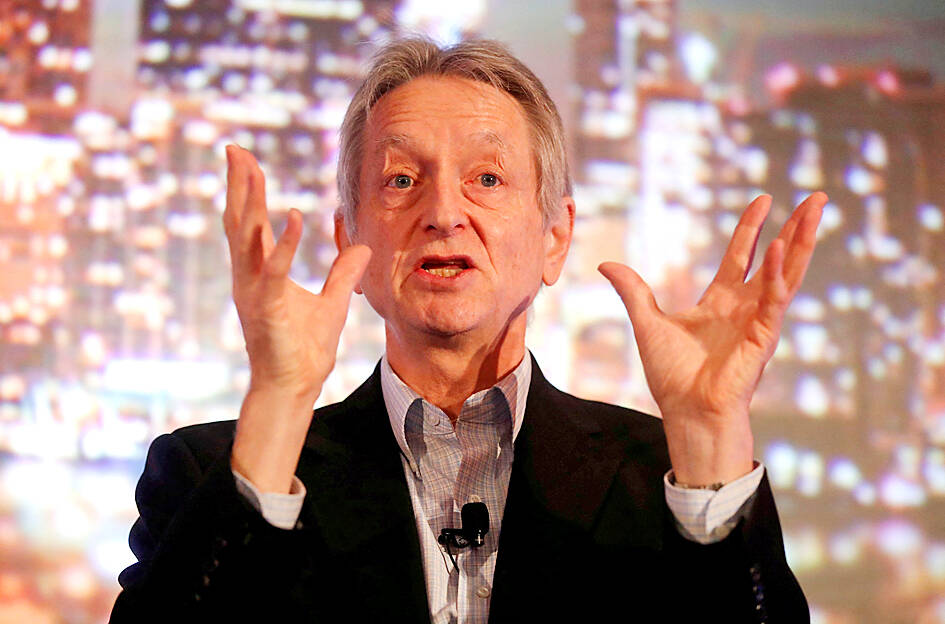A computer scientist often dubbed “the godfather of artificial intelligence” (AI) has quit his job at Google to speak out about the dangers of the technology, US media reported on Monday.
Geoffrey Hinton, who created a foundation technology for AI systems, told the New York Times that advancements in the field posed “profound risks to society and humanity.”

Photo: Reuters
‘THAT’S SCARY’
“Look at how it was five years ago and how it is now,” he was quoted as saying in the article.
“Take the difference and propagate it forwards. That’s scary,” he said.
Hinton said that competition between tech giants was pushing companies to release new AI technologies at dangerous speeds, risking jobs and spreading misinformation.
“It is hard to see how you can prevent the bad actors from using it for bad things,” he told the Times.
Last year, Google and OpenAI — the start-up behind the popular AI chatbot ChatGPT — started building systems using much larger amounts of data than before.
Hinton told the Times he believed that these systems were eclipsing human intelligence in some ways because of the amount of data they were analyzing.
“Maybe what is going on in these systems is actually a lot better than what is going on in the brain,” he told the paper.
While AI has been used to support human workers, the rapid expansion of chatbots such as ChatGPT could put jobs at risk.
AI “takes away the drudge work,” but “might take away more than that,” he told the Times.
MISINFORMATION
The researcher also talked about the potential spread of misinformation created by AI, saying that the average person would “not be able to know what is true anymore.”
Hinton notified Google of his resignation last month, the Times reported.
Jeff Dean, lead scientist for Google AI, thanked Hinton in a statement to US media.
“As one of the first companies to publish AI Principles, we remain committed to a responsible approach to AI,” the statement added. “We’re continually learning to understand emerging risks, while also innovating boldly.”
In March, tech billionaire Elon Musk and a range of experts signed an open letter calling for a pause in the development of AI systems to allow time to make sure they are safe.
Hinton did not sign that letter at the time, but told the New York Times that scientists should not “scale this up more until they have understood whether they can control it.”

Quanta Computer Inc (廣達) chairman Barry Lam (林百里) is expected to share his views about the artificial intelligence (AI) industry’s prospects during his speech at the company’s 37th anniversary ceremony, as AI servers have become a new growth engine for the equipment manufacturing service provider. Lam’s speech is much anticipated, as Quanta has risen as one of the world’s major AI server suppliers. The company reported a 30 percent year-on-year growth in consolidated revenue to NT$1.41 trillion (US$43.35 billion) last year, thanks to fast-growing demand for servers, especially those with AI capabilities. The company told investors in November last year that

Intel Corp has named Tasha Chuang (莊蓓瑜) to lead Intel Taiwan in a bid to reinforce relations between the company and its Taiwanese partners. The appointment of Chuang as general manager for Intel Taiwan takes effect on Thursday, the firm said in a statement yesterday. Chuang is to lead her team in Taiwan to pursue product development and sales growth in an effort to reinforce the company’s ties with its partners and clients, Intel said. Chuang was previously in charge of managing Intel’s ties with leading Taiwanese PC brand Asustek Computer Inc (華碩), which included helping Asustek strengthen its global businesses, the company

Taiwanese suppliers to Taiwan Semiconductor Manufacturing Co. (TSMC, 台積電) are expected to follow the contract chipmaker’s step to invest in the US, but their relocation may be seven to eight years away, Minister of Economic Affairs J.W. Kuo (郭智輝) said yesterday. When asked by opposition Chinese Nationalist Party (KMT) Legislator Niu Hsu-ting (牛煦庭) in the legislature about growing concerns that TSMC’s huge investments in the US will prompt its suppliers to follow suit, Kuo said based on the chipmaker’s current limited production volume, it is unlikely to lead its supply chain to go there for now. “Unless TSMC completes its planned six

TikTok abounds with viral videos accusing prestigious brands of secretly manufacturing luxury goods in China so they can be sold at cut prices. However, while these “revelations” are spurious, behind them lurks a well-oiled machine for selling counterfeit goods that is making the most of the confusion surrounding trade tariffs. Chinese content creators who portray themselves as workers or subcontractors in the luxury goods business claim that Beijing has lifted confidentiality clauses on local subcontractors as a way to respond to the huge hike in customs duties imposed on China by US President Donald Trump. They say this Chinese decision, of which Agence